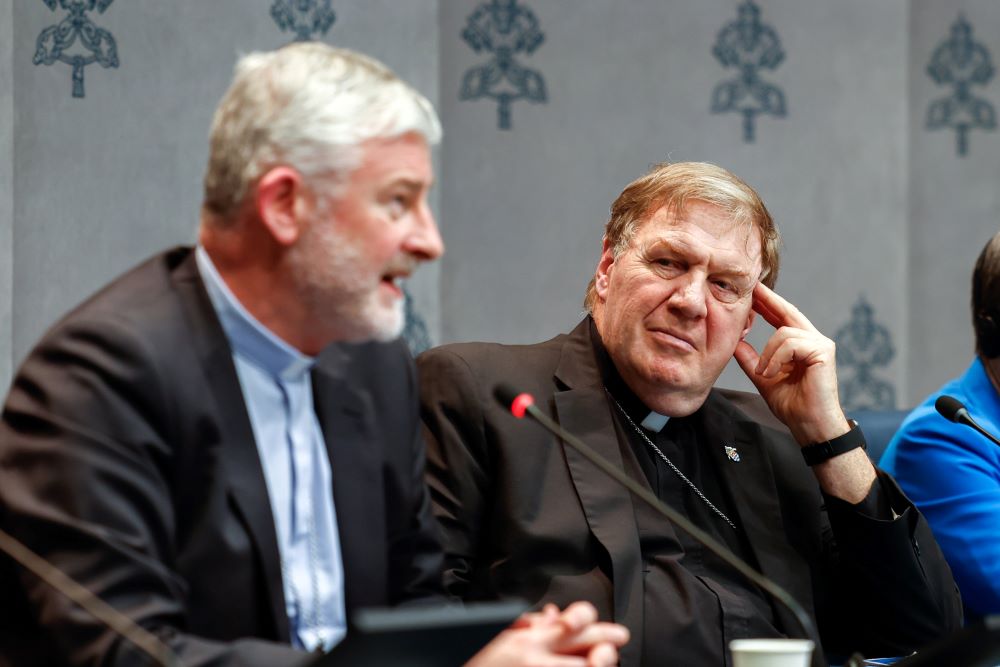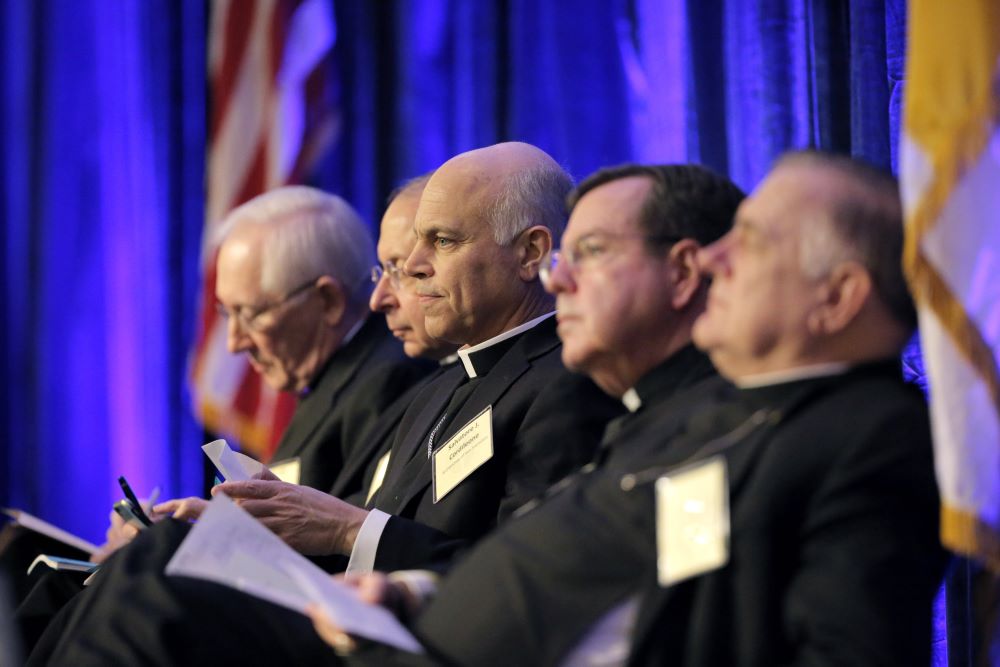
Cardinal Joseph W. Tobin of Newark, N.J., looks on at the Vatican Oct. 11 as Bishop Shane Anthony Mackinlay of Sandhurst, Australia, speaks at a press briefing on the synod. Tobin, Chicago Cardinal Blase Cupich and San Diego Cardinal Robert McElroy met with Pope Francis Oct. 10. The trio has not made public what they discussed at the meeting. (CNS photo/Lola Gomez)
Three U.S. cardinals met with Pope Francis the morning of Oct. 10.
Cardinal Joseph Tobin of Newark said they addressed challenges in the United States.
Unless it was a 14-hour meeting, which it was not, how did they select which challenges to address? Joining Tobin were Chicago Cardinal Blase Cupich and San Diego Cardinal Robert McElroy. Together, the trio compose Team Francis in the United States. As close advisers to the pope, they keep their counsel.
Yet the meeting was not a secret, and the public nature of the meeting sent a message.. It was held in the Apostolic Palace and placed on the pope's public schedule of meetings, not held privately at the Domus Sanctae Marthae, where the pope lives and hosts meetings he does not want made public. The Vatican released a photo of the meeting.
Lacking inside information on the private meeting, the most likely challenge at the top of the list was the need to fill the many vacancies in the nation's dioceses, especially in the metropolitan archdioceses. As of today, eight archdioceses are led by bishops past the retirement age of 75, with another six crossing that threshold next year.
The pope has the chance to alter the trajectory of the U.S. hierarchy, one that has been uniquely resistant to this Holy Father's agenda, as witnessed by the large number of bishops who publicly issued statements of support for then-Archbishop Carlo Maria Vigano when he tried to affect a putsch against Pope Francis in 2018.
The top of my list for replacement is Archbishop Allen Vigneron of Detroit, who hit the retirement age of 75 a year ago. His successor will need to confront the hotbed of anti-Francis sentiment that is Sacred Heart Seminary. The new archbishop in Motor City will need to rebuild the morale of the clergy as well.
Next up is the relatively small Archdiocese of Kansas City, Kansas. The urgency here is that incumbent Archbishop Joseph Naumann embodies precisely the kind of culture warrior style that is the antithesis of the pastoral approach Pope Francis has proposed. He continues to advocate shuttering the U.S. church's anti-poverty program, the Catholic Campaign for Human Development, even though the U.S. bishops reiterated their strong support for the program at their June meeting
Naumann also was one of those who, when confronted with Vigano's tendentious "manifesto" in 2018, issued a statement calling the former nuncio a "man of integrity." He couldn't muster a kind word for the object of Vigano's attacks, Pope Francis. And, if you hadn't noticed, Naumann was one of the leaders of the bishops' pro-life efforts, which they have managed to drive into the ditch.

Members of the working group for the Faithful Citizenship document participate in the 2015 fall general assembly of the U.S. Conference of Catholic Bishops in Baltimore. Pictured are Archbishop Leonard Blair of Hartford, Conn.; Baltimore Archbishop William Lori; San Francisco Archbishop Salvatore Cordileone; Detroit Archbishop Allen Vigneron and Archbishop Thomas Wenski of Miami. (CNS/Bob Roller)
Houston Cardinal Daniel DiNardo turned 75 this year, and his health has not been great since he suffered a stroke in 2019. As president of the U.S. Conference of Catholic Bishops, DiNardo, rudely responded to remarks from then-Bishop Robert McElroy during the 2015 debate about "Faithful Citizenship," the bishops' quadrennial document on voting. McElroy pointed out the difficulties of the text, in a thoughtful way, and DiNardo dismissed his comments as "rhetorical flourishes." The remark drew gasps in the room where even heated exchanges are free from that kind of derisiveness.
Other challenges are not so pressing.
Archbishop Dennis Schnurr in Cincinnati turned 75 last year. Archbishop Thomas Rodi of Mobile, Alabama, hit the retirement age this year, as did Omaha's Archbishop George Lucas. These men keep a relatively low profile, avoiding the kind of vitriol some of their confreres spout. If they stay on a few more years, it would not be a problem.
One prelate over 75 who has been a steadfast supporter of Pope Francis is Washington, D.C., Cardinal Wilton Gregory. He will turn 77 in December, but his health has been uneven and sources tell me the process of selecting his successor has begun.
If Donald Trump wins the presidency, it is difficult not to see how the pope could avoid sending Cardinal McElroy to the nation's capital. The church would need someone who does not need to make a phone call to answer a question about the U.S. Constitution or U.S. politics, and then evaluate the advice he receives. McElroy has been a serious scholar of American political history since his undergraduate days.
Advertisement
If Kamala Harris wins, she will do some things the Catholic Church opposes, perhaps many things. But she would not threaten the constitutional order. In that case, there are a few other possible candidates for Washington. Top of the list is Brownsville, Texas, Bishop Daniel Flores, who has been a bishops' conference point man for the synod, presiding over a session in the past week*. He inhabits the exact center of the U.S. bishops' conference — conservative on issues of sexuality and progressive on issues of social justice.
Seattle Archbishop Paul Etienne is another person to keep an eye on. He fits the mold of the kind of bishop the pope likes. Etienne is also here at the synod. And, there could be some other candidate for the post not yet on anyone's radar screen. Most people were surprised when Bishop Richard Henning was named to Boston in August, so there might yet be an unexpected pick for Washington.
The pope stays very well informed about the state of the church throughout the world. This meeting indicates Team Francis wanted to communicate with him that there remain challenges.
Perhaps they discussed something other than the docket of bishoprics, but I doubt they were betting on whether the Yankees would win the World Series or comparing notes on which restaurant has the best carbonara.
*Editor's note: This sentence has been modified for clarity.







